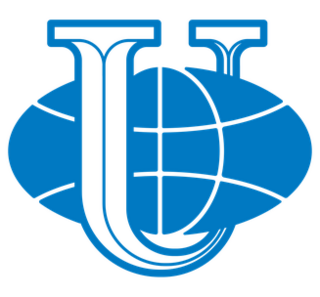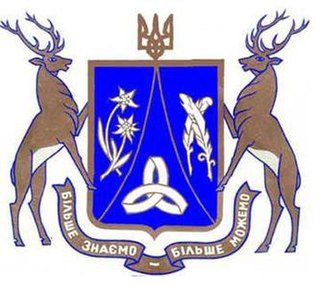
The Kristianstad University is a university college (högskola) in Kristianstad, Sweden.

Moscow State University (MSU), officially M. V. Lomonosov Moscow State University, is a public research university in Moscow, Russia. The university includes 15 research institutes, 43 faculties, more than 300 departments, and six branches. Alumni of the university include past leaders of the Soviet Union and other governments. As of 2019, 13 Nobel laureates, six Fields Medal winners, and one Turing Award winner were affiliated with the university.

The National Research Tomsk State University, TSU is a public research university located in Tomsk, Russia. The university, which opened in 1888, was the first university in the Asian part of Russia and, in practice, the first Russian university East of the Volga.

Kazan Federal University is a public research university located in Kazan, Russia.

Saint Petersburg State University is a public research university in Saint Petersburg, Russia, and one of the oldest and most prestigious universities in Russia. Founded in 1724 by a decree of Peter the Great, the university from the beginning has had a focus on fundamental research in science, engineering and humanities.

The Patrice Lumumba Peoples' Friendship University of Russia, also known as RUDN University and until 1992 and after March 2023, as Patrice Lumumba University in honour of the Congolese politician Patrice Lumumba, is a public research university located in Moscow, Russia. It was established in 1960 by a resolution from the Central Committee of the CPSU and the Council of Ministers of the USSR to help nations to assist countries that had recently achieved independence from colonial powers. The university also acted to further Soviet foreign policy goals in nonaligned countries.

Moscow State Institute of International Relations (MGIMO) is an institute of higher education located in Moscow, Russia. The institute is run by the Russian Ministry of Foreign Affairs.

The Russian State University for the Humanities, is a university in Moscow, Russia with over 25,000 students. It was created in 1991 as the result of the merger of the Moscow Urban University of the People and the Moscow State University for History and Archives.

National Research Tomsk Polytechnic University (TPU) is a technical university in Russia. TPU was a member of 12 international associations, including the Conference of European Schools for Advanced Engineering Education and Research (CESAER) until it was suspended in March 2022, and the European University Association (EUA) until it was suspended in March 2022. TPU was included in Project 5-100, a 2013 state program aimed at bringing at least five Russian universities from among the project participants into the 100 best universities in the world.

Viktor Antonovich Sadovnichiy is a Russian mathematician, winner of the 1989 USSR State Prize, and since 1992 the rector of Moscow State University. One of the main opinion leaders in Russia, Sadovnichiy has significant political and social influence.

Southern Federal University, abbreviated as SFedU and formerly known as Rostov State University (1957–2006), is a public university in Rostov Oblast, Russia with campuses in Rostov-on-Don and Taganrog. In 2023 US News & World Report ranked it # 1,647 in the world.

The Plekhanov Russian University of Economics is a public research university in Moscow, Russia. It was founded in 1907 by entrepreneur Alexei Vishnyakov as the first finance-specialized college in the Russian Empire.

HSE University, officially the National Research University Higher School of Economics is a public research university founded in 1992 and headquartered in Moscow, Russia. Along with its main campus located in the capital, the university maintains three other regional campuses in Nizhny Novgorod, Perm and Saint Petersburg. There is also the Lyceum at HSE University in Moscow.

Uzhhorod National University is a Ukrainian state higher educational institution in the city of Uzhhorod in Ukraine.
The Network of Universities from the Capitals of Europe (UNICA) UNICA is a network of 46 universities from the capital cities of Europe, with a combined strength of over 150,000 staff and 1,800,000 students. It also seeks to be a driving force in the development of the Bologna process and to facilitate the integration of universities from Central and Eastern Europe into the European Higher Education Area. The office of the network is located in the University Foundation in Brussels.

Borys Grinchenko Kyiv Metropolitan University is a higher education institution. The university was established by Kyiv municipal council through reorganization of Kyiv regional Teachers Training Institute named after Borys Hrinchenko. The university is communal property.

Moscow State University of Civil Engineering or MGSU is a higher education institution located in Moscow, Russia. It is located on Yaroslavl Highway in Yaroslavsky district.

Valery Nikolayevich Falkov is a Russian jurist and politician who is serving from 21 January 2020 as the Minister of Science and Higher Education of Russia. Prior to that he was the rector of Tyumen State University.
On 4 March 2022, the Russian Union of Rectors signed an address in support of the 2022 Russian invasion of Ukraine. The letter was signed by heads (rectors) of 304 higher education institutions in Russia. It was highly publicized inside Russia, but internationally it only led to further isolation of Russian educational institutions.

On 24 February 2022, Russia invaded Ukraine in a major escalation of the Russo-Ukrainian War which began in 2014. The invasion caused Europe's largest refugee crisis since World War II, with more than 8.2 million Ukrainians fleeing the country and a third of the population displaced. The invasion also caused global food shortages. Reactions to the invasion have varied considerably across a broad spectrum of concerns including public reaction, media responses, and peace efforts.

















